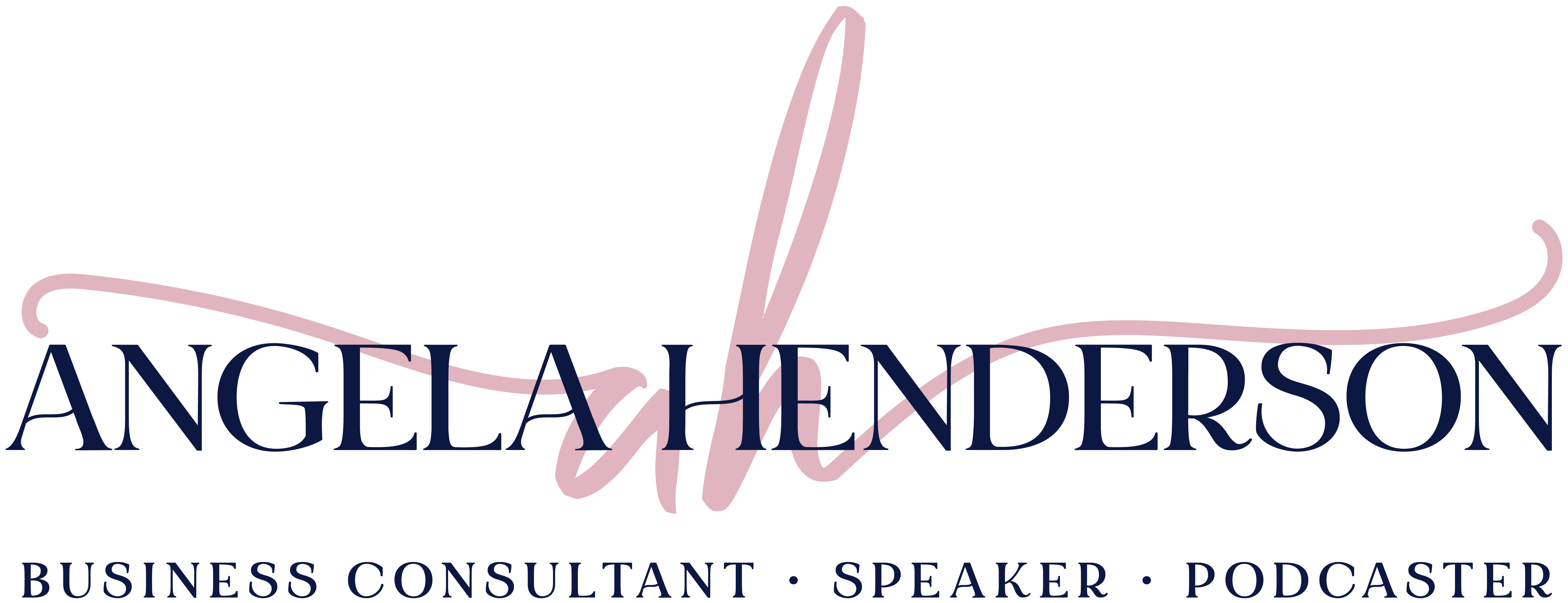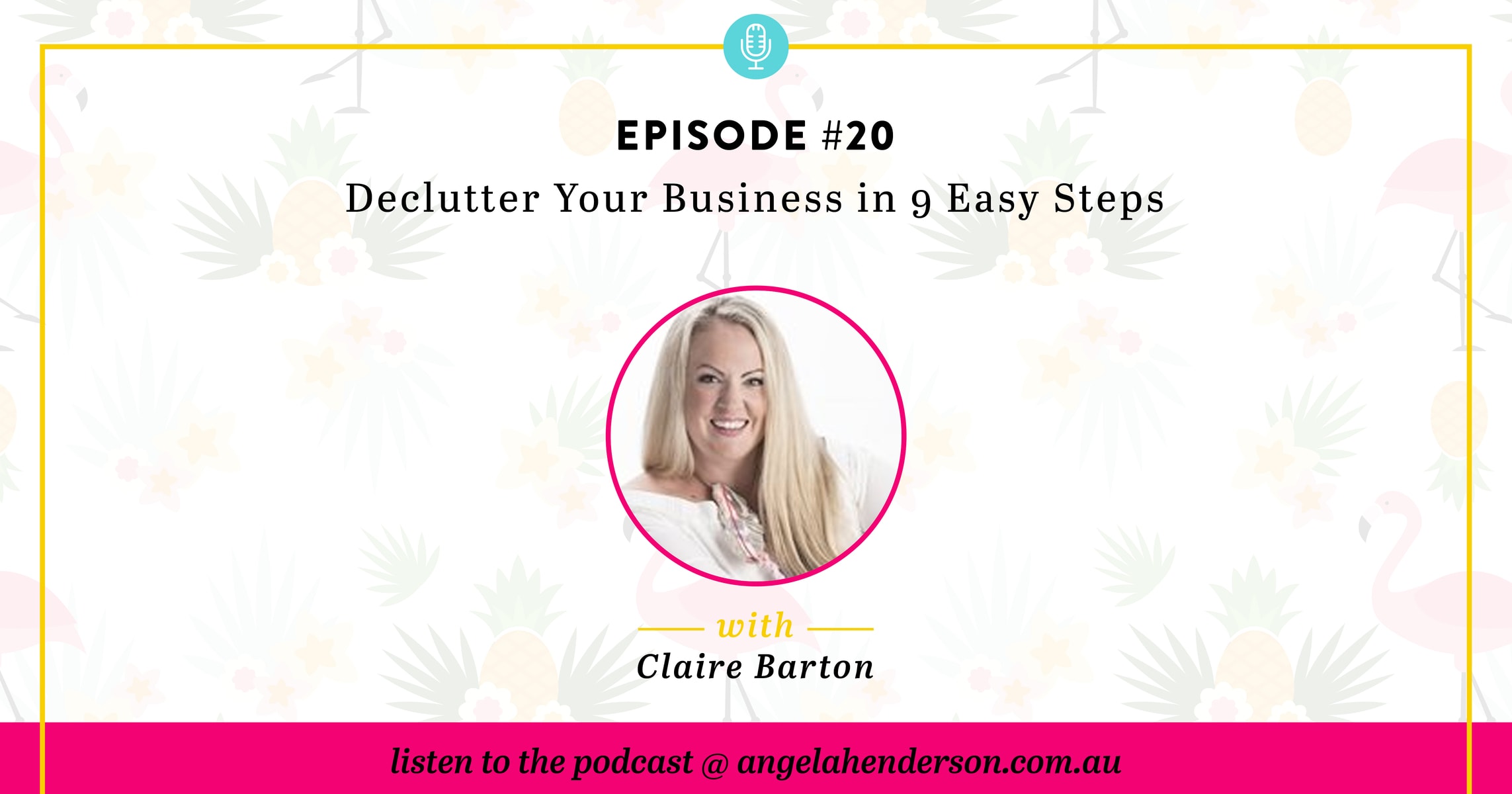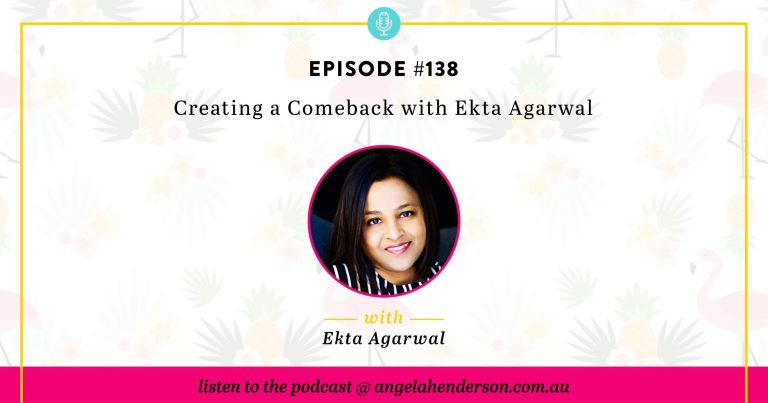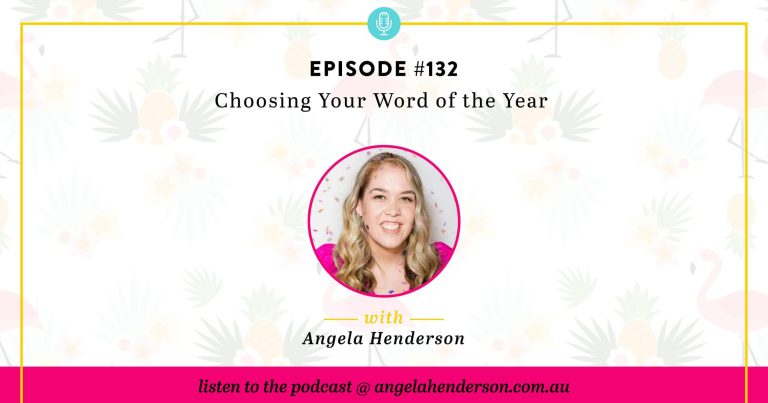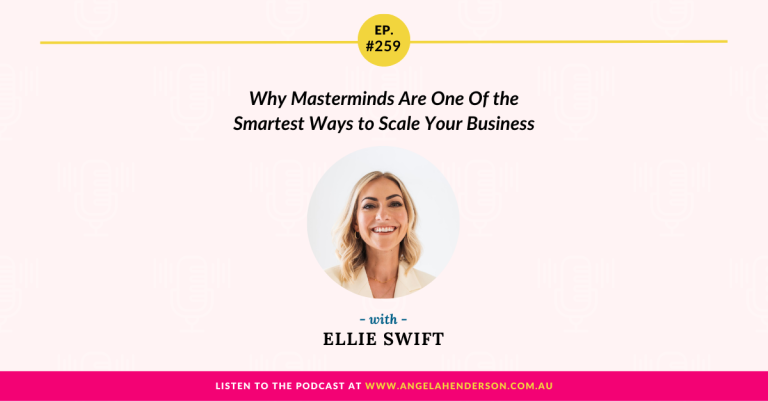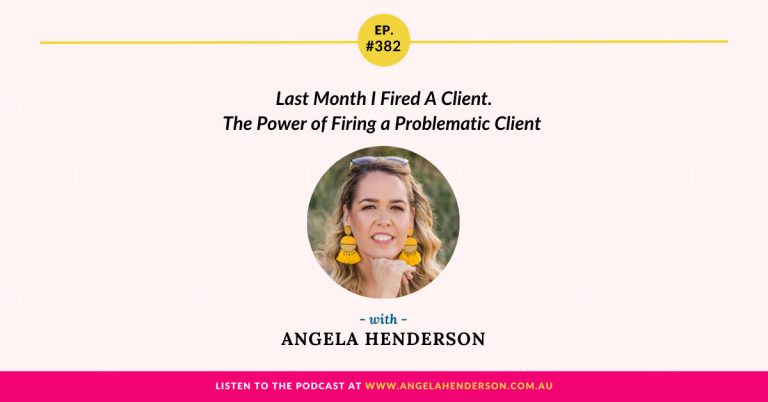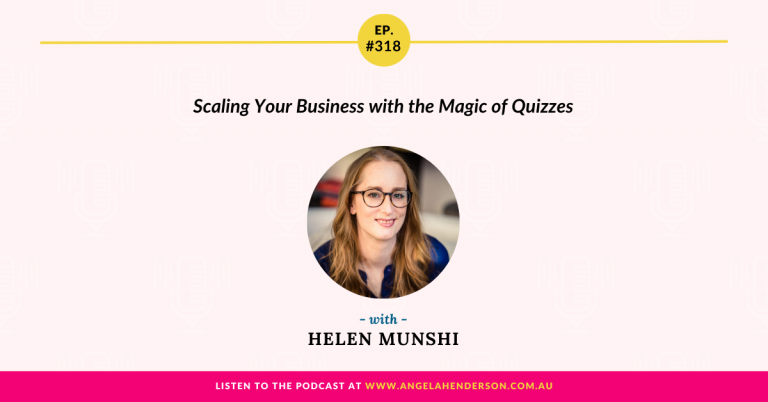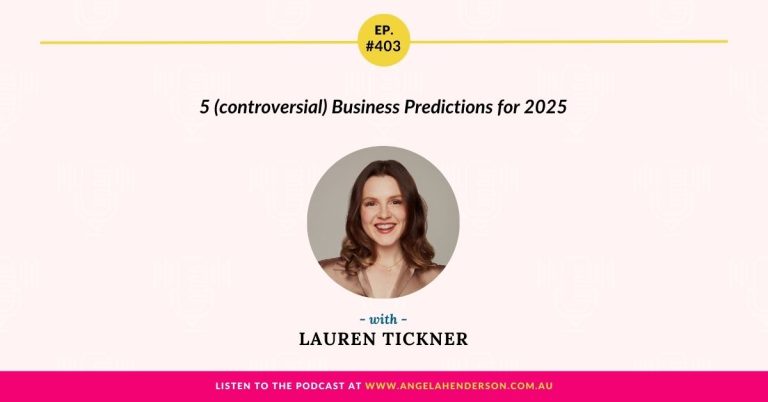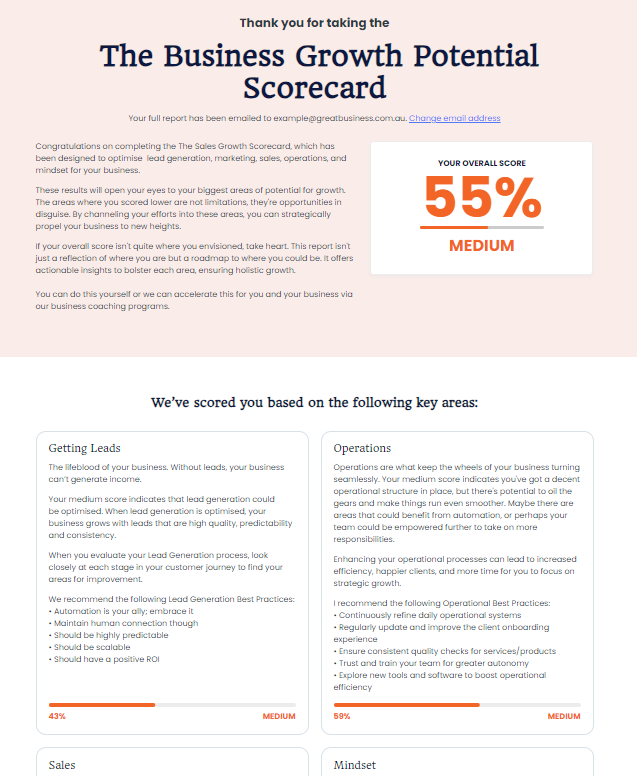Claire Barton, a Content Strategist & Business Mentor, joins us in this episode to talk about the benefits of decluttering your business with the help of technology and organization. She shares with us 9 easy steps we can do to restore calm and beauty into our work.
Important Links Mentioned in the Show:
Angela Henderson Active Business Facebook Group
Angela Henderson Facebook Business Page
Prefer to read Declutter Your Business in 9 Easy Steps? Here’s the transcript:
ANGELA:
You’re listening to the Business and Life Conversations podcast, with Angela Henderson, episode 20.
Hey there, you’re listening to the Business and Life Conversations podcast, my name is Angela Henderson, and on this show we talk about improving your business, life or both. By having amazing and rich conversations with brilliant guests. Who will inspire you and who will give you tips and tricks, to help you grow both in life and in business.
All right, all right, it’s another episode of Business & Life Conversations Podcast with me, your host, Angela from Angela Henderson Consulting. I’m delighted to have the magnificent, Claire Barton joining us today to talk about decluttering your business in nine easy steps. Claire is a content strategist from Brisbane and what I love about Claire, she’s all about putting the perfectionism and overwhelm to the side in order for businesses like yours and mine to get organised so that we can shine. I’m super excited for Claire to share her nine easy steps to decluttering business. Welcome to the show, Claire.
CLAIRE:
Hi. Thanks so much for having me.
ANGELA:
Hello, hello. Now listen, you’ve just come back from four magnificent weeks in beautiful Bali so welcome back to sunny Brisbane, Australia.
CLAIRE:
Thank you.
ANGELA:
How are you settling in?
CLAIRE:
Yeah, pretty good, a bit of holiday hangover, but … No, really good, really good. The last eight or nine days that I was away was all about creativity and chilling and doing less so I’m pretty re-refreshed and energised.
ANGELA:
Re-refreshed and energised. We were talking though funnily enough prior to the starting of the recording of the show about what it’s like coming back and entering in from when you’ve been on a holiday, whether or not it’s for business, whatever, and you come back and you’re like boom, bam, welcome home to kids, hubby, house and all the other duties, and then we’re going, “Ah,” it can be such a little bit of a mind mess up sometimes that we’ve got to change our speed. Yes, welcome back.
CLAIRE:
Thank you.
ANGELA:
Now I do like the listeners to get to know you a little bit more before we jump right into the business side of things. Tell us something magical that happened over in Bali. What was your big takeaway for life, business, a combination of both?
CLAIRE:
Look, I guess, I had nine days of holiday with my family before they came home and then I run my own retreat and as I said, I went on this beautiful creativity and meditation retreat. Look, I guess the biggest thing that I got from the entire thing was the beauty that you get from Asia about actually slowing down, doing less, connecting more and not adding more things to your to-do list and that sort of thing. I love going to Asia for a bit of reality check on all the life stuff. I think that’s always a really good takeaway, but yeah, definitely the …
I always say when you go anywhere in Asia, it’s a real … There’s always the two ends of the spectrum. It’s faster and it’s slower. It’s easier and it’s harder and all that sort of thing. Actually, making the choice to pick the bits out of your life when you get home that are working and try and eliminate the other ones that aren’t working so much. I think that was probably my biggest takeaway is to actually try and do less, connect more and stop adding things to the list of to-dos just for the sake of adding them to my list.
ANGELA:
Absolutely. I guess there’s also a difference that I always say is are you being productive or are you just busy?
CLAIRE:
That’s so true.
ANGELA:
What is it? You can rewrite lists a million times and you can do this a million times, but it doesn’t mean you’re productive and,or scaling your business in any way. It just means that you’re busy and potentially have a hobby.
CLAIRE:
Absolutely, yeah, yeah, that’s right.
ANGELA:
Obviously, you were also in Bali for your own retreat. I guess give the listeners a little bit of information about who Claire is, what your business is and who you kind of serve so we can have a little bit of context before we jump into this podcast a little bit deeper.
CLAIRE:
Yeah, sure. I’ve been running this business for about three years, but I’ve been in business management since I was 19 years old in one way, shape or form, including operations and logistics and all the back of house stuff, and it’s definitely where I shine. I’m a Virgo so I was basically destined to work in a business where I could just organise things and make things more efficient and effective and easy all day long so I’m in my happy place 99% of the time.
I work mainly with women who have online, generally service-based businesses, sometimes a little bit of product, but usually more service based. The two main things that I help with is content strategy – so creating content whether that’s to be a blog or videos, webinars, podcasts, social media, newsletters, website, all of that sort of thing, everything where people can get those impression points from you and making sure that that’s aligned to your message and that it resonates with your tribe and helps you to build your business and isn’t just there for the sake of having a blog because someone told you it was great for your business.
ANGELA:
Yes.
CLAIRE:
So that’s the big things that I run and that was definitely part of the … Where my retreat started, I have a monthly membership called Batch It Crazy, which is all about creating consistent and aligned content and the retreat is called the Batch It Crazy Retreat, but it’s definitely become more of a retreat for people to come and start, finish and launch a project.
ANGELA:
Yes.
CLAIRE:
We had a couple of people in Bali who created courses or redesigned their entire business model including all their services and products and that sort of thing. That’s kind of the other 50% of what I do is more about the structures, systems, and strategy for your business to make sure that you’re, as you said, not just spinning the wheels, you’re not just being busy, you’re not just doing things because you’re ticking a box that your business coach told you you had to do. It’s really about making sure that what you’re doing is aligned to how you want to build your lifestyle around your business and you’re not just trading time for money and you’re actually doing things that are easy to deliver and aligned to your own goals and that sort of thing, in a really structured and systematic and efficient way.
ANGELA:
Yeah. Yeah. Like you said, you’ve got those two components really. The batching kind of component and the structure there and whatever that looks like and then obviously, that content, that rich content, which again is needed. There needs to be an element about how does your listeners or your consumers consume information? What do they need from you? How are you doing that on a regular basis?
Now obviously in order to even get to that level though, there is an element of decluttering and I do see businesses all the time who are super stressed, overwhelmed and they’re just kind of running from one task to another. I think, again, as I’m sure you know coming back from Bali, I’ve just come back from Bali, but there is something magical about decluttering, collectively. Internally with yourself, decluttering in your life, your family, etcetera. But we’re on today though is more about business. Why do you think businesses need to declutter and what are the benefits from doing this?
CLAIRE:
Yeah, it’s so true. I think coming back after living out of a suitcase for four weeks and not wanting for anything, it’s a real kind of reality check on actually how much stuff we surround ourselves in online and virtually, as well as physically that it just adds to the overwhelm and doesn’t actually help us get anywhere except for more busy and feeling like there’s this sort of heaviness around. I think when you get to a point where you realise you’re just cluttered and you’re busy and you’re going through different lists and just moving things around and shuffling paperwork basically, you know that you’re wasting time. You know that you’re wasting energy and resources doing things that aren’t actually moving you towards your goals.
Having less in your business, less places to have to check, less places to have to spend time, less stuff to look through when you’re finding for something and having some really efficient systems that work for you, I think definitely helps you to have that feeling of productivity. A lot of people who I work with, I know that they will definitely benefit from taking some stuff out or from doing less, but their overwhelming feeling is that they’re not productive enough. They’re not getting enough done. They don’t feel like they’re moving forward and that sort of thing. The more that you can sort of strip out, the easier it is to actually move forward in your business.
ANGELA:
I guess you could say the benefits are that you can move forward, you’re more efficient potentially, you’re more productive and you probably have a clearer vision about what needs to be done just like just go and do it versus all this kind of softer fluff that’s been around until you declutter.
CLAIRE:
Exactly, yeah.
ANGELA:
Now in the beginning of one of your blog articles, I just want to get people in the mood about what we’re kind of talking here and to see if people can resonate. It’s not anything sexy or anything like that, but I do think it’s a little bit fun to get people into it. I just want to read a little bit of your script from one of your blogs that you have on your website about decluttering. If anyone out there is listening, before we jump into the goodness that Claire is going to offer us with the top nine tips that she can give us to declutter, let’s see if anyone else kind of feels like this.
“It’s Monday morning. You have the house to yourself, a whole lot to do and a cup of coffee and you may actually get to drink it while it’s still hot.” Amen? Anyone else feel like a hallelujah there? “You walk into your home office and bam. It’s like the yuck hits you. You know there are hundreds of unread emails in your inbox. Your desk is a complete pig sty. Your to-do list consists of roughly 11 million scraps of paper” all over your, office and then you find things in the kitchen. With every random thought you’ve got, you’re kind of just you’re trying to survive. You’ve been there before. You think that buying the next shiny object, is going to help resolve your problems so you buy the shiny object, but actually you’ve never used it. It’s still sitting in your pig sty on your desk. Yes, I mean I think there’s many of us out there that can feel that why, that it’s just like “Oh, my goodness, I don’t even know where to start.”
Again, that’s where you’re going to come in. Like I said, I felt like this. I’m sure many of you listening are the same way. Claire, please share your top nine quick fixes to get shite in order so that we can all restore calm and beauty into our work. Share with us these wonderful tips.
CLAIRE:
Excellent. Number one is getting your emails under control. Now there’s a bit of a joke. Every time someone has an inbox and I happen to glance at it for some reason and it’s got 4,000 unopened emails, they joke like “Oh, don’t look, please, do this,” because it does make me feel even a little bit choked up just thinking about having to deal with that. It is one of those things that I think is so simple to manage and so easy to keep under control, but it seems to be super overwhelming for a lot of people.
One of my hacks is using unrollme.com … Sorry, unroll.me and it’s a great app. You basically hook up your email addresses and you can select which ones you want to keep coming into your inbox, unsubscribe from or roll up, which means you can roll it up into a daily email which you get from UnrollMe. It has like a screenshot of the first part of it. You can choose whether you want to open it or not and it just means that you’re getting one email a day instead of how many hundreds you normally get, just one quick way.
There are a few, a bit of … What’s it called? The terms and conditions and everything that you need to read and make sure you’re okay with it. It doesn’t actually unsubscribe you from a list. It actually just puts it into a different folder, but it means you don’t see it and if it means getting rid of those 4,000 emails out of your inbox so that you’re not completely overwhelmed, I think that it’s a pretty good one so..
ANGELA:
Gosh. Absolutely. Is there a cost associated with that?
CLAIRE:
No, it’s totally free. If anyone goes and has a look at my blog, there’s a screenshot of my three email accounts where I’ve unsubscribed from 253, 441 and 31 respectively, and that was from about a year and a half ago. I think when I looked most recently, one of my accounts, I’d unsubscribed from over 800 lists. You can imagine even just getting one of those a month, that’s 800 emails a month that I’m no longer getting into my inbox. Totally worth anything that might ever happen just to remove all of that clutter and all of that stuff.
ANGELA:
All right, so getting emails under control is tip number one and a cool hack that you can do this is using the UnrollMe format and that will help people to get their email under control. All right, sweet. Tip number two.
CLAIRE:
Beautiful. The second one is to organise your paperwork. Now most of us work in a pretty paperless system, which is fantastic, great for the environment, much better for our mental health, not being surrounded by all of this paperwork. Go through everything. Do whatever you need to do. If there’s things that you absolutely must keep, obviously keep them and file them.
I love systems where I can take a photo of the paperwork, upload it to somewhere like Dropbox or Evernote or whatever, wherever it is that I’m storing it and delete, shred and recycle the paper that it actually came on. Anything that I can get electronically, all of my bills, all of that sort of thing, I make sure that it comes in electronically. I have a system with myself and with my VA and my team to file that efficiently so I can always find it. It’s always still there, but it’s not physically around me. Being able to go everywhere and go overseas for four weeks and not have to take 15,000 bits of paper or notebooks and that sort of thing is really, really important to me. I think for your laptop lifestyle that a lot of us are trying to accommodate, going paperless as much as possible is definitely a big thing as well.
ANGELA:
I also like that, again, if you do need it, that’s fine. Take a screenshot of it. Take a photo of it and then upload it into a file in Dropbox where it can be stored out of sight, out of mind, but I also like the fact that then you can then recycle the paper and we’re also still helping the environment to the best that we can. Sweet.
CLAIRE:
Yeah, absolutely, absolutely. I’ve also got two little kids so anything that’s only single sided gets a line through it and it goes into the scrap paper pile so they can do their drawings..
ANGELA:
Perfect. I do like a good recycle. Trust me. My little one, Chloe’s a drawer so I’m like, “Do not touch the good paper. Go and get some scrap paper.”
CLAIRE:
I know. I know.
ANGELA:
All right. Cool. Tip number three.
CLAIRE:
Number three is to get your to-do list organised. There’s so many times when people got a to-do list in maybe an app like Asana or they also use their reminders app and they use their iNotes app and they use paper notes and they’ve got a diary and they’ve got a notebook here and a notebook there, and here and there a notebook, everywhere a notebook sort of thing …
One of the first things I often do with people when they’re in that state of overwhelm is to how to roll that up and just get it into a central location and that simple action of just getting it all into one place so that you know there’s nothing that’s fallen through the cracks, nothing that’s going to trip you up later because you’ve forgotten it and actually having it all in one place is so, so valuable.
I love Asana. Anyone who’s ever heard me say anything has probably heard me say the word Asana. It’s a beautiful tool. It’s free again. It’s like to-do list on steroids and it can be used for a million different things so I put everything in there. You can use it on your desktop. You can use it on your phone or your tablet as well so you can see exactly what you have to do.
My big thing with to-do lists is I have sort of three. My main one is just a general to-do list. It’s something that needs to be done within the next short period of time so maybe within the next month or so. Then I have a priorities list where I only put three to five things every day or at a time so I know exactly what I’m focusing on this week or this day or in this work session. Then the third one is called the toy box or the shiny object box or whatever you want to call it. That’s all the things that you’d like to do at some point that isn’t a priority or doesn’t need to be done straight away. That’s how I set out all of that stuff and you can..
ANGELA:
I think it is important that, again, you can have great ideas and you want to capture those ideas, but I too use the toy box analogy like put it away, put it in the toy box. It will still be there when you want to come and play with it the next time, but just focus on the things that you need to get done before you start moving onto something else.
CLAIRE:
Yeah, that’s right. One of my favorite things for that is actually recording it. If you’ve got a voice recorder on your phone or something like that, record what the idea is because when you and instead of, set a reminder to go and have a look at it again in say two weeks time. What that does is you can hear all the elements, all of the ideas. You can hear the energy and the excitement and all of that sort of thing behind it. Then you can make the decision whether like, “That is a great idea, that’s amazing. I’m totally going to do that or what was I thinking? That’s going straight to the bin.”
ANGELA:
Yes. Chuck that one out.
CLAIRE:
It just gives you a little bit of space because how many times do we go, “Oh, I might just create a course or I might create a thing,” for whatever and you go and do it and then, you think, “What the hell? That’s so outside of my business or someone’s already got that or that’s not going to help where I’m trying to get to,” but you’ve just wasted the last two weeks putting all your time and energy and focus into it. Actually, it’s derailed you from what you were doing before.
ANGELA:
Yeah. No, I couldn’t agree more on that one because it’s sometimes like I said, especially those like me with ADHD, I can get lost very, very quickly in my thoughts so yes. Moving on to tip number four.
CLAIRE:
Lovely. The next one is to pick a small physical space to clean up and make it beautiful. We were just talking about this before. Your house can be beautiful one day and a total bomb site the next. Sometimes, I come home and I think I haven’t got time, the energy, mental capacity to do everything, but I just need a little scope of vision. I just need a little space to sit and feel like “Okay, this is calm. This is tidy. This is organised. I like looking at it. I like seeing what’s in front of me,” and that sort of thing. You can’t do everything so just pick a little space.
Whether that’s your desk or a little corner of your, I don’t know, your couch or outside or something like that and just make it a space that you really want to spend time in that day or for that moment or whatever. Often it is literally a corner. In your bedroom or something like that. Get a candle. Put a couple of nice books there. Get your nice coffee mug. It doesn’t have to be Instagram worthy. It just has to make you feel like the entire place isn’t going to come crumbling down on your head and it’s a nice harmonious space to play in.
ANGELA:
Exactly right. Again, it’s better to have a clear space to be able to be productive and efficient and being work friendly than just going like, your whole vibe. You’re like, “Oh, this sucks. Everything’s a mess.” Cool. Declutter one little element. Don’t tackle everything, just one particular element of the house or your office, etc. to make it a little bit better.
CLAIRE:
Exactly, yeah.
ANGELA:
Yeah. Sweet. Tip number five.
CLAIRE:
Tip number five is to do a bit of a declutter of your head space. This is something that can be super helpful to do with someone, with an accountability buddy, a peer, a coach, something like that, but you can do it by yourself as well and it’s really just about doing a big brain dump. Getting everything out of your head. Sometimes people like to do like a mind map. Sometimes it’s a list for me. It’s always a list because that’s just how my brain works. I write the list of all the lists I want to write, but having a dedicated period of time, whether it’s 5 minutes or half an hour or whatever just to get it all out. You can speak it out if that’s easier or you can write it down or something like that.
But just to feel like you don’t have to keep all the mental balls in the air. You don’t have to keep everything in your head because if you don’t remember something, it’ll be gone or whatever. Knowing that it’s written down somewhere, knowing that it’s out, actually, you can see it when someone does it with you, you see their shoulders drop about 5 centimetres by the end of it because they’re like “Oh, that burden is gone. I’ve captured it. Now my head can actually sink and there’s some clarity.” Physically, mentally doing a bit of a mental declutter is just such a powerful thing.
You know when you meditate and it’s all about observing the thoughts as they come and then letting them go and then coming back, to that sort of thing. It actually doesn’t happen unless you’ve got some way for that information to still be captured somewhere that you feel safe and secure so you’re not going to forget it and you’re not going to drop the balls and you’re not going to forget that it’s book week next week and you’ve got a birthday party to go to and you’ve got a cake to bake and all that sort of thing. It’s actually there. It’s captured. It’s on your to-do or it’s on a big map or something like that. You can actually get back into the zone and be focused and present on what you need to be focused and present on.
ANGELA:
I do like that that, again, you’ve tied the okay, if you can do decluttering of your physical environment, but so many people will forget the mental health.
CLAIRE:
Totally.
ANGELA:
Or the mental side of things. Again, one doesn’t work without the other. Now I would love to say I agree about meditation. However, I’ve never actually done it so I can’t actually fully say that I knew where you were going with that, Claire, ’cause I don’t want to lie to those people who think I’m into meditation … Not that I’m not into it. I just felt I’m like the ADHD and I’m like I think we … I know this is totally on a tangent, but Claire and I were talking about or maybe it was Shanae, another one of our mutual friends. She has this floating tank that you can go in. I just remember the first time I was in it, I was like … It’s supposed to be calm and zen. I’m like counting how many times I could touch my toes and how long it will take me to get from there.
Super, it is calming. But not the essence of like I think you’re supposed to be like within yourself. Yes. But I can appreciate that I’m assuming that again, you need to have a clear head in order for you to get to the zone or the zen or …
CLAIRE:
Yeah, I don’t know. I’m certainly no meditation guru or yogi or anything like that, but being on this meditation retreat definitely has awakened my understanding of how busy my head just always is. I was the same in the float tank. I spent half the time trying to think of ways that you could design a white board or a chalk board that would work in that environment so that I could write all the ideas down that I was having while I was in the float tank. I was exactly the same.
It’s not even about meditation. You can take that totally out of the equation, but you know what it’s like when you just feel overwhelmed and there’s so much in your head that you’re trying to keep going with … You can’t be productive. You can’t get anything done. There’s just competing priorities, competing thoughts, competing issues, problems, ideas, all that sort of thing. Getting it out means that you can then start organising your thoughts a little bit more so that you can dedicate the time and energy to each of those things that they’re due.
ANGELA:
I know an old high school teacher that I … Obviously back in the day, I don’t want to show my age to too many, almost 40.
CLAIRE:
Two or three years ago.
ANGELA:
Yes, yes. She said that ’cause her brain would go so quickly at nighttime, which was … She just wanted to shut off that she had a notebook by her bed and so she said she would rather be able to do a quick brain dump and she actually felt that she was able to … Not just felt, but she did, her brain closed down a lot quicker by just getting them out of her head and onto paper so she didn’t have to hang onto them anymore. It’s a similar, type of thing is that you just want to get it out to then free you up for something else.
CLAIRE:
Absolutely. I think that’s a great idea. I used to do that when I was a bit younger as well and now I often just use my notes because my notes on my iPhone ’cause I do religiously use that anyway. Yeah, I’m a bit the same and I’ve got Asana so it’s easy to just go in and add something like. “don’t forget to do this tomorrow or I put this right into my calendar,” or something like that. I am very paperless so any opportunity that I have to put a reminder in or whatever, I have systems written down, but generally just in my head as well of how I’d do things so that I don’t feel like I have to take the stresses to bed and all that sort of thing. Yeah, I think that that’s really cool.
Same for first thing in the morning, like how nice is it to process your dreams or your thoughts or your worries or your whatever for the day before you actually get out of bed and just feel like you can get up and go and enjoy your coffee, rather than having to race through all those 5 million things you have to do today.
ANGELA:
One hundred, one hundred percent. All right. Tip six.
CLAIRE:
All right, tip six, going back to something a bit more virtual now is to declutter your apps. Delete anything that is unused. This goes for your documents, your phone or your desktop or whatever. Go through and just clean it off. I don’t know how many apps, probably over 200 I reckon on my phone, but every month or so, I go through and I delete the ones that I haven’t used for a little while because you hear about these shiny objects and people are like, “This app’s amazing. It’s changed my life.” You’re like, “I better go and get it then.” You go and get it and then you never sign into it. You never use it. You never do anything with it.
Then, I don’t know, when you’re looking for something, obviously you can use the search function, but sometimes you’re just having a scroll and just having to go through more stuff adds to the feeling of overwhelm. If you’re not using it, just delete it. I’m big with this. I’ve got the next, number seven is about deleting all of the other things. Mush these two together, but basically..
ANGELA:
Perfect.
CLAIRE:
… anything that doesn’t need to be done or used I would say if you’ve got something on your to-do list, it’s been on there for six months and it hasn’t happened yet and the world hasn’t imploded, just delete it. Seriously. Put them in the toy box or delete it or delegate it or whatever you need to do, but if it’s just sitting there. It hasn’t actually impacted anything. Get rid of it. It’s not critical. It’s not crucial. There’s obviously a block there. Either work through the block or just don’t worry about it at all. It’ll come back up if it needs to.
ANGELA:
I do think there’s something to be said that, again, by just having to see that reminder like “Oh, I didn’t do that again. Oh, I didn’t do that again. Oh, I didn’t do that again.”
CLAIRE:
Totally.
ANGELA:
That’s how I was, yeah, Social Media Marketing World is over in the U.S., one of the biggest conferences over there and I kept saying that I was going to apply to be a speaker and then, I was like … Literally that was in March and it was last week that I was like, “Oh, my goodness, if I rewrite this on my to-do list one more time,” and I was like, that too, I was either, “I’m either doing it or I’m not.” It’s either a priority or it isn’t and that’s okay if it’s not.
CLAIRE:
Yeah.
ANGELA:
I just stopped what I was doing, went and did it, and I was like, “Oh, my goodness, it’s actually, I did it. It’s done.” I was like, “Okay,” but I agree with you that having to see it over and over again is actually going to potentially cause you more anxiety or more stress or more overwhelm because it’s just a reminder like, “Well, if I didn’t do it … ” Yeah, I’m with you. Flick that off and yeah, flick off all those other ones, too. Perfect. Now tip number eight.
CLAIRE:
Tip number eight is to organise your money. Everyone gets a bit freaked out by this one.
ANGELA:
Money, money, money.
CLAIRE:
Yeah. Look, that can be everything from getting your tax done or looking at your bookkeeping. I’m not a mathematical person, but I absolutely love looking at my numbers. I use Wave apps, which is a free bookkeeping tool and I absolutely love it. I use it for all my personal stuff and all my business stuff. I’ve integrated Profit First and Barefoot Investor as well for my business and for our personal stuff. I’m kind of like up to my elbows in all the money stuff and I really love owning that and planning it out and looking at it all the time and that sort of thing. It’s quite a big mindset thing for me. It’s quite a big motivator as well, but I think just the basics.
A lot of people kind of, I don’t know, go under a bit of a rock when it comes to money, especially for your business. It doesn’t have to be as crazy as installing a new app and getting a bookkeeper and all of that sort of thing, but if you can get to grip with your finances, have some system, even if it’s a shoebox, you just put all of your receipts in there at the end of the week or whatever it is, just understanding where you are with your money, where it’s going, what you need to do to hit your goals. If you have any goals and if you … You should obviously have some goals when it comes to your money. You’re not doing this as a charity or a hobby. Just really feeling like you understand and you own and you know where all your number stuff is at is such a powerful activity to do and yeah, I think it’s a really great reality check sometimes and it’s a really great motivator as well.
ANGELA:
I also think there’s something there again from a mindset perspective that again, out of sight, out of mind, but when … With all of my own coaching clients, the thing is that on the first of every month or the first Monday of every month, they need to go in and fill in their Google Analytics. They need to go in and fill in their numbers from the last month so that we’ve got a clear understanding of what happened last month and what our target is for the following month. Some of my clients, they’ll be a little bit resistant to it, but once we actually do it, they’re like, “Oh, my goodness, I actually had 500 people read this blog. I thought there was only two people.” I think there’s something very powerful there that, seeing it, it’s in your forefront that helps you with your overall business growth.
CLAIRE:
Yeah, absolutely. I have a little spreadsheet, a PDF called Tribe Tracker. I’m the same. It’s a freebie. It’s out there for everyone, but especially when I’m working with people, we talk about that as well. At the end of the month, so we look at all the social followers, the content numbers and the income and all of that sort of thing. It’s just incredible when you start to see, “Oh, the months that I do great social media content or I ran a webinar or I put out a new freebie or something and my list grows, I also have income growth the next month or the same month,” or whatever and, “those months where I didn’t do a blog or I was telling you about my freebies, I didn’t make an income that month.” “Oh, that’s why it’s important. It’s not just because someone said you should have a blog so I’m doing a blog.” It’s actually impacting the people who can find you and connect to you and start working with you and all that sort of thing.
That’s what it’s all about. You can’t just hope for the best and do some things because they’re on your list and then hope that that’s going to make you some money. You’ve actually got to know where and why and how your money is coming in to you and how people are finding you and all of that sort of thing. Yeah, reporting, it doesn’t have to be convoluted. It doesn’t have to be money centric, but it’s pretty important to know what’s actually going on in your business. How can you make decisions if you don’t know what’s already happening?
ANGELA:
That would work. Spot on. Love it. Our last tip, tip number nine.
CLAIRE:
Last one is to align and cancel. What I mean by that is to continuously check in with things like your calendar and your to-do list and where you’re spending your time and energy. This was a really big one for me. Probably around the time that I wrote this blog a bit over a year ago that I realised I had been to something like 14 events over the space of two weeks, meetups and coffee dates and chats, and all that sort of thing, but I was … In the 14 hours, I had probably spent 30 hours or so doing them in terms of travelling and preparing for them and all that sort of thing and I made no money. I was like, “What the hell am I doing? I’m not doing this in a focused way. I’m not doing this in a very strategic way.” I was just saying yes to everything, but actually it was taking me away from the work that I needed to be doing and then I was feeling overwhelmed because I wasn’t getting to do the business building and business income generating things as well.
I made a decision about how I was going to filter my yes and no answers too to events especially. Actually, having a look through. You could do this retrospectively. You can do this … It’s a great time management tool to actually understand where your time’s all gone. You get to the end of the week and you’re like, “Shit, I’ve got nothing done this week. How come?” You look back through your calendar and it’s pretty clear to see sometimes you either just dillydallied around and not done very much or there hasn’t been a clear thing that you wanted to do or you get sidetracked because everyone wants like, “Let’s have a coffee or let’s go do this.”
Look, I’m a massive fan of … I work for myself, I can say yes to coffees if I want to, but I also have to be really smart about that because I do have limited time. I’ve got kids and a thousand other things to do and I have priorities. Giving yourself the permission to say no to things. I always think if I say yes to this, what am I saying no to? If I say no to this, what am I saying yes to? Really making sure the way you spend your time and energy and with whom and doing what sort of activities goes through the filter of your own lifestyle and business goals as well.
It’s okay to cancel things. It’s okay to say no. You’re not going to be a bad person if you don’t go to every single meet up you get invited to. It has to be strategically aligned and also feed your energy. I’m an introvert so going to 15 things in two weeks, I just wanted to go to my cave for a month afterwards and not talk to anyone. You’ve got to understand where you get your own energy from and what depletes it and build it up as well.
ANGELA:
I did. That’s what I did last year was everything, and pretty much still this year is, for everything I say yes to, I’m saying no to something else. So if I’m saying yes to this, it might be I’m saying no to tucking my kids into bed. And is it going to help my business, is it going to help the people that I’m helping at that particular time and if not, it is a no. It’s okay to say no.
CLAIRE:
Yes, that’s it.
ANGELA:
Sweet, there’s nine great tips and the whole point of this is to help you guys declutter and to feel less overwhelmed and les stressed. But I would say to some of you guys, like, “Oh my goodness, nine great tips so where do I start?” I would suggest you choose one.
CLAIRE:
Yes.
ANGELA:
Choose one or maybe choose your top three and then choose one at a time and then go through them. Not all of these tips are going to be applicable to you and your family or your business, but if you apply at least one or two of these tips, your world is going to a much better place. So again, if you’re feeling overwhelmed because there’s so many great tips, again choose one, choose two do them well and then look at the others if they’re still relevant at that particular time.
Claire, if the listeners would like to know a little bit more about you, where can they find you?
CLAIRE:
Yeah sure, so Facebook is a great place to find me www.facebook.com/clairebartoncoaching. There’s always loads of great content on there and blogs and all of that sort of thing. Or my website is www.clairebarton.com.au
ANGELA:
Perfect, perfect. Well thank you so much for joining me today, I know we’re not actually far from each other. I think we’re only about a 15 minute drive from each other, so we could have done this together live but unfortunately we didn’t. Thank you so much.
CLAIRE:
Thanks for having me.
ANGELA:
And for those of you who are wondering where you’re going to be able to get all of these wonderful tips, my team and I will also put together the whole transcription for this episode at www.angelahenderson.com.au and of course I cover all sorts of related business and life topics inside my Facebook group, The Australian Business Collaborative, and I’d love to see you join me over there. But until then, have an awesome day everyone, no matter where you are in the world and I look forward to connecting with you all very soon. Have a great day, everyone. Bye!
Thanks for listening to the Business and Life Conversations podcast with Angela Henderson, Declutter Your Business. www.angelahenderson.com.au.
